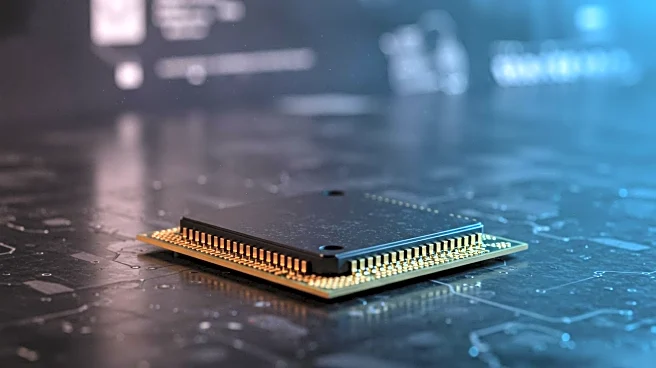What's Happening?
The Trump administration is reportedly considering converting Intel's subsidies under the CHIPS Act into a 10% ownership stake in the company. This strategic move is aimed at enhancing domestic semiconductor manufacturing capabilities. The potential acquisition is part of efforts to support Intel's plan to establish a flagship manufacturing hub in Ohio. The announcement has already impacted market dynamics, with Intel's shares experiencing significant movement. Additionally, Softbank has announced its intention to purchase a $2 billion stake in Intel, underscoring the increasing interest and investment in semiconductor innovation within the United States.
Why It's Important?
The potential acquisition of a stake in Intel by the Trump administration signifies a substantial commitment to bolstering the U.S. semiconductor industry. This move could enhance national security by reducing reliance on foreign semiconductor sources and fostering technological advancements domestically. The investment aligns with broader efforts to secure supply chains and promote economic growth through innovation. Stakeholders in the semiconductor industry, including manufacturers and tech companies, stand to benefit from increased investment and support. However, this could also lead to increased scrutiny and regulatory challenges as the government becomes more involved in private sector operations.
What's Next?
If the Trump administration proceeds with acquiring a stake in Intel, it may lead to further government involvement in the semiconductor industry, potentially influencing policy decisions and investment strategies. The move could prompt reactions from other tech companies and industry leaders, who may seek similar support or partnerships. Additionally, the development may attract attention from international competitors and allies, impacting global semiconductor market dynamics. Stakeholders will likely monitor the situation closely to assess the implications for future collaborations and investments.
Beyond the Headlines
The potential government stake in Intel raises questions about the balance between public and private sector roles in technological innovation. It may spark debates on the ethical and legal implications of government ownership in private enterprises, particularly in strategic industries like semiconductors. Long-term shifts could include increased government influence over corporate governance and decision-making processes, potentially affecting the autonomy of tech companies.










